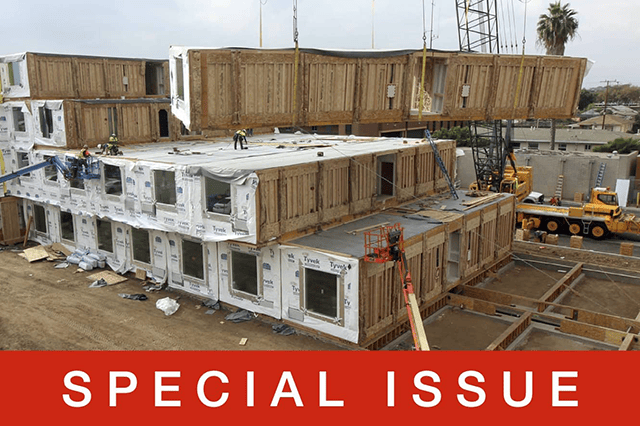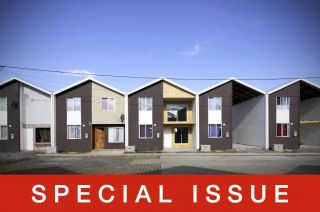
www.buildingsandcities.org/journal-content/special-issues/modern-methods-construction.html
Modern Methods of Construction: Beyond Productivity Improvement

This special issue investigates the broader implications and consequences of MMC over the life of the building - for both civil society and the construction industry.
Modern methods of construction (MMC) are being promoted as a solution to the perceived failings of the construction sector. The narrative is notably characterised by a strong pro-innovation bias. This special issue examines the assumptions underpinning the prevailing 'presumption in favour' of MMC. Evidence is offered about the externalities which lie beyond the narrowly-defined construct of productivity.
Guest editor: Stuart D. Green
Very little evidence exists on the implications of MMC for the material fabric of the built environment. There is also a recurring reluctance to investigate and learn the lessons from previous attempts at the industrialisation of construction. This is of particular concern within the context of housing, although it applies equally to other sectors. A lack of data exists on the implications of MMC for the performance and longevity of buildings, and their ability to respond over time to shifting societal and occupant needs. The durability and adaptability of buildings are of central importance for resource consumption and for the achievement of a net-zero carbon economy. Further concerns relate to environmental performance and occupant wellbeing. Even more importantly, significant concerns remain regarding the implications of MMC for fire safety.
This special issue initiates an important discussion about MMC in its various forms (pre-manufactured value, offsite, industrialised construction, etc). In particular, whether the existing evidence base and research focus have been too narrow and need to be broadened in order to better understand and evaluate the implications of MMC. Is the research community investigating the appropriate questions about MMC and pursuing the interests of wider society? Is the current regulatory regime adequate to identify and reduce new risks?
The safety of the building in use and the potential risks to occupants are vital issues. Meacham's paper focuses on the fire performance and regulatory considerations associated with MMC. He argues that the adoption of MMC presents challenges to traditional building regulatory approaches. Particular attention is focused on the void spaces between prefabricated components, and especially those that exist between prefabricated modules. This paper deserves to be read widely, and its recommendations need to be actioned.
Dowsett et al. take a broad interpretation of MMC as comprising one of many possible constituent technologies of the Fourth Industrial Revolution. They argue that current debates are often dominated by notions of top-down 'technological prediction'. Instead, they offer a co-creation approach using scenario-planning rooted in the tradition of storytelling. This is used to explore how technologies are likely to play out in a highly heterogeneous construction sector. They especially privilege the views of small and medium-sized enterprises (SMEs) which are held to be more representative of the construction sector than tier 1 contractors. A useful methodology is provided for structuring a much broader and more realistic debate about the future role of technologies in construction.
Table of Contents
Modern methods of construction: reflections on the current research agenda
S.D. Green
Fire performance and regulatory considerations
with modern methods of construction
B.J. Meacham
Speculation beyond technology: building scenarios through
storytelling
R.M. Dowsett, M.S. Green & C.F. Harty
Commentaries
The Need for a 'Critical Turn' in Construction Management Research
R Leiringer & A Dainty
Modernize and Die? Challenging Technological Optimism in Construction
F. Sherratt
Situating MMC within Technological Adoption
G. de Valence
Modern methods of construction: unintended consequences
S.D. Green
Critical reflections on the Construction Playbook
S.D. Green
A history of failed dreams: modern methods of construction and Katerra
A. Rabeneck
Latest Peer-Reviewed Journal Content
Energy sufficiency, space temperature and public policy
J Morley
Living labs: a systematic review of success parameters and outcomes
J M Müller
Towards a universal framework for heat pump monitoring at scale
J Crawley, L Domoney, A O’Donovan, J Wingfield, C Dinu, O Kinnane, P O’Sullivan
Living knowledge labs: creating community and inclusive nature-based solutions
J L Fernández-Pacheco Sáez, I Rasskin-Gutman, N Martín-Bermúdez, A Pérez-Del-Campo
A living lab approach to co-designing climate adaptation strategies
M K Barati & S Bankaru-Swamy
Mediation roles and ecologies within resilience-focused urban living labs
N Antaki, D Petrescu, M Schalk, E Brandao, D Calciu & V Marin
Negotiating expertise in Nepal’s post-earthquake disaster reconstruction
K Rankin, M Suji, B Pandey, J Baniya, D V Hirslund, B Limbu, N Rawal & S Shneiderman
Designing for pro-environmental behaviour change: the aspiration–reality gap
J Simpson & J Uttley
Lifetimes of demolished buildings in US and European cities
J Berglund-Brown, I Dobie, J Hewitt, C De Wolf & J Ochsendorf
Expanding the framework of urban living labs using grassroots methods
T Ahmed, I Delsante & L Migliavacca
Youth engagement in urban living labs: tools, methods and pedagogies
N Charalambous, C Panayi, C Mady, T Augustinčić & D Berc
Co-creating urban transformation: a stakeholder analysis for Germany’s heat transition
P Heger, C Bieber, M Hendawy & A Shooshtari
Placemaking living lab: creating resilient social and spatial infrastructures
M Dodd, N Madabhushi & R Lees
Church pipe organs: historical tuning records as indoor environmental evidence
B Bingley, A Knight & Y Xing
A framework for 1.5°C-aligned GHG budgets in architecture
G Betti, I Spaar, D Bachmann, A Jerosch-Herold, E Kühner, R Yang, K Avhad & S Sinning
Net zero retrofit of the building stock [editorial]
D Godoy-Shimizu & P Steadman
Co-learning in living labs: nurturing civic agency and resilience
A Belfield
The importance of multi-roles and code-switching in living labs
H Noller & A Tarik
Researchers’ shifting roles in living labs for knowledge co-production
C-C Dobre & G Faldi
Increasing civic resilience in urban living labs: city authorities’ roles
E Alatalo, M Laine & M Kyrönviita
Co-curation as civic practice in community engagement
Z Li, M Sunikka-Blank, R Purohit & F Samuel
Preserving buildings: emission reductions from circular economy strategies in Austria
N Alaux, V Kulmer, J Vogel & A Passer
Urban living labs: relationality between institutions and local circularity
P Palo, M Adelfio, J Lundin & E Brandão
Living labs: epistemic modelling, temporariness and land value
J Clossick, T Khonsari & U Steven
Co-creating interventions to prevent mosquito-borne disease transmission in hospitals
O Sloan Wood, E Lupenza, D M Agnello, J B Knudsen, M Msellem, K L Schiøler & F Saleh
Circularity at the neighbourhood scale: co-creative living lab lessons
J Honsa, A Versele, T Van de Kerckhove & C Piccardo
Positive energy districts and energy communities: how living labs create value
E Malakhatka, O Shafqat, A Sandoff & L Thuvander
Built environment governance and professionalism: the end of laissez-faire (again)
S Foxell
Co-creating justice in housing energy transitions through energy living labs
D Ricci, C Leiwakabessy, S van Wieringen, P de Koning & T Konstantinou
HVAC characterisation of existing Canadian buildings for decarbonisation retrofit identification
J Adebisi & J J McArthur
Simulation and the building performance gap [editorial]
M Donn
Developing criteria for effective building-sector commitments in nationally determined contributions
P Graham, K McFarlane & M Taheri
Join Our Community

The most important part of any journal is our people – readers, authors, reviewers, editorial board members and editors. You are cordially invited to join our community by joining our mailing list. We send out occasional emails about the journal – calls for papers, special issues, events and more.
We will not share your email with third parties. Read more



Latest Commentaries
COP30 Report
Matti Kuittinen (Aalto University) reflects on his experience of attending the 2025 UN Conference of the Parties in Belém, Brazil. The roadmaps and commitments failed to deliver the objectives of the 2025 Paris Agreement. However, 2 countries - Japan and Senegal - announced they are creating roadmaps to decarbonise their buildings. An international group of government ministers put housing on the agenda - specifying the need for reduced carbon and energy use along with affordability, quality and climate resilience.
Building-Related Research: New Context, New Challenges
Raymond J. Cole (University of British Columbia) reflects on the key challenges raised in the 34 commissioned essays for Buildings & Cities 5th anniversary. Not only are key research issues identified, but the consequences of changing contexts for conducting research and tailoring its influence on society are highlighted as key areas of action.